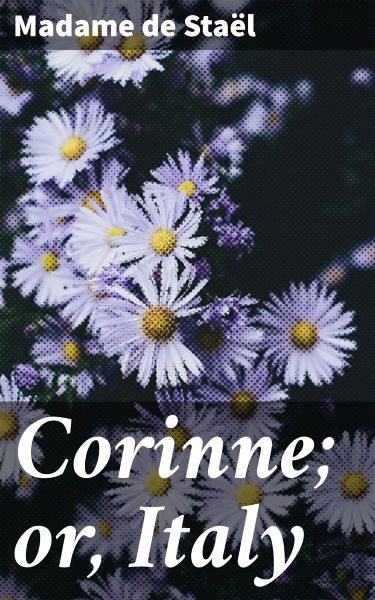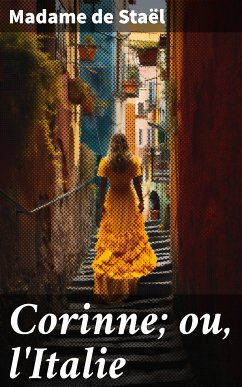
Corinne; or, Italy (eBook, ePUB)
Enriched edition. Exploring art, love, & politics in picturesque Italy: A feminist masterpiece of Romantic literature
Kommentar: Blackwood, Nigel / Redaktion: Good Press / Übersetzer: Hill, Isabel; L. E. L.

PAYBACK Punkte
0 °P sammeln!
In "Corinne; or, Italy," Madame de Staël weaves a rich tapestry of Italian culture through the lens of the titular character, Corinne, a poet and artist who embodies the dynamic tension between artistic aspiration and societal constraints. The novel intertwines themes of love, nationalism, and the quest for self-identity, all while employing a lyrical prose style that showcases Staël's erudition and deep appreciation for the Italian landscape. Set against the backdrop of early 19th-century Europe, the book also reflects the burgeoning Romantic movement, emphasizing individual expression and ...
In "Corinne; or, Italy," Madame de Staël weaves a rich tapestry of Italian culture through the lens of the titular character, Corinne, a poet and artist who embodies the dynamic tension between artistic aspiration and societal constraints. The novel intertwines themes of love, nationalism, and the quest for self-identity, all while employing a lyrical prose style that showcases Staël's erudition and deep appreciation for the Italian landscape. Set against the backdrop of early 19th-century Europe, the book also reflects the burgeoning Romantic movement, emphasizing individual expression and the sublime qualities of nature. Madame de Staël, a prominent intellectual and salonnière, was deeply immersed in the cultural and political currents of her time. Her experiences in Italy and her complex relationships with influential Romantic thinkers undoubtedly shaped her portrayal of the vibrant, yet often tumultuous, interplay between personal freedom and societal expectations. Staël's own exile from France due to her opposition to Napoleon adds a layer of poignancy to her exploration of the individual's struggle for autonomy and authenticity. "Corinne; or, Italy" is a must-read for enthusiasts of Romantic literature and those interested in the intersections of identity, art, and culture. Staël's insightful characterizations and evocative descriptions provide the reader with not just a story, but an immersive journey into the heart of Italy, making it an essential addition to any literary collection. In this enriched edition, we have carefully created added value for your reading experience: - A succinct Introduction situates the work's timeless appeal and themes. - The Synopsis outlines the central plot, highlighting key developments without spoiling critical twists. - A detailed Historical Context immerses you in the era's events and influences that shaped the writing. - An Author Biography reveals milestones in the author's life, illuminating the personal insights behind the text. - A thorough Analysis dissects symbols, motifs, and character arcs to unearth underlying meanings. - Reflection questions prompt you to engage personally with the work's messages, connecting them to modern life. - Hand-picked Memorable Quotes shine a spotlight on moments of literary brilliance. - Interactive footnotes clarify unusual references, historical allusions, and archaic phrases for an effortless, more informed read.
Dieser Download kann aus rechtlichen Gründen nur mit Rechnungsadresse in A, B, BG, CY, CZ, D, DK, EW, E, FIN, F, GR, H, IRL, I, LT, L, LR, M, NL, PL, P, R, S, SLO, SK ausgeliefert werden.













